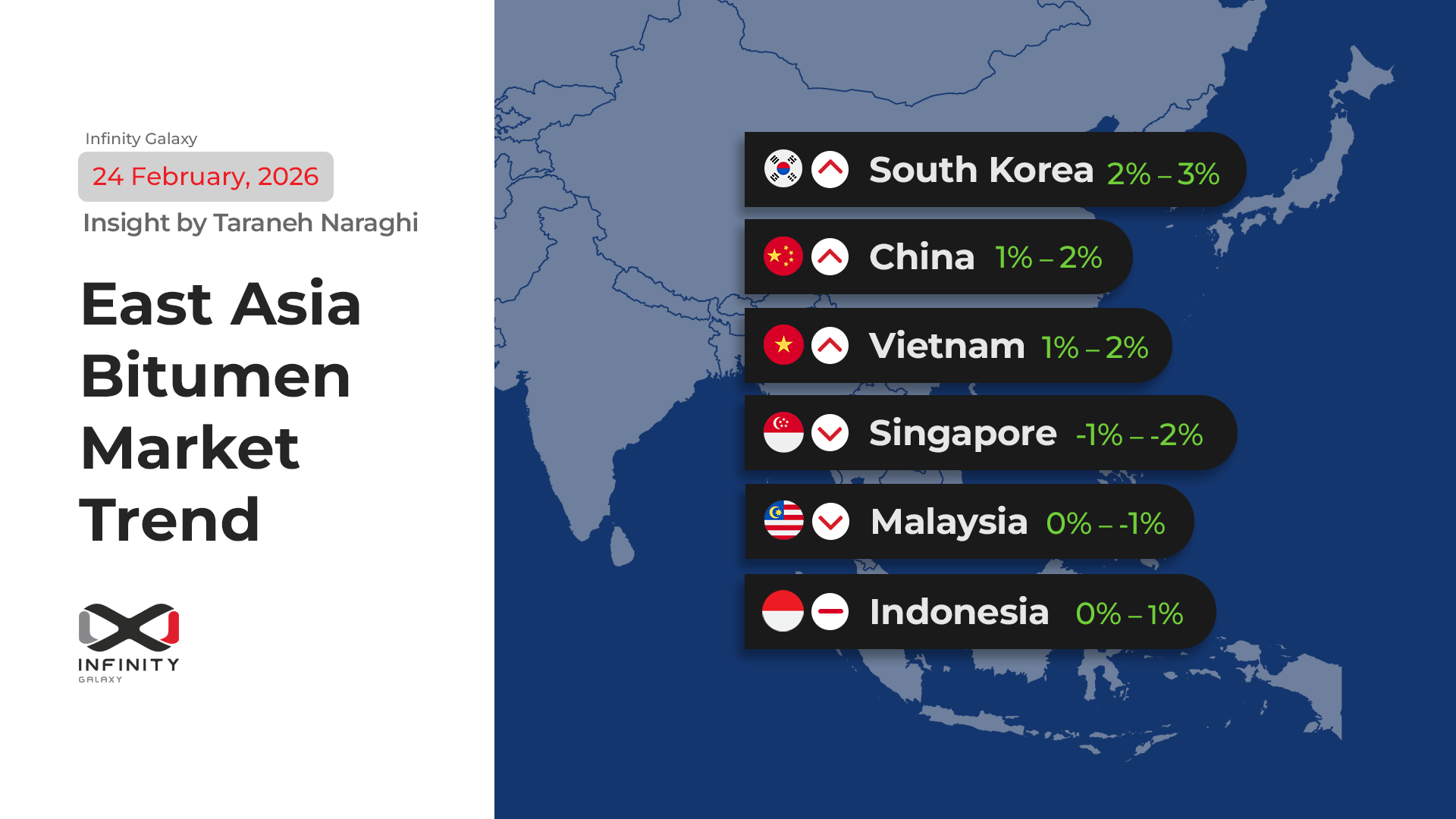Weekly Bitumen Report: Attacks on Qatar, New Risks in Bitumen Market?

The Political and Economic Developments of the Week
Non-Stop Geopolitics: Israel’s Attack to Doha and Market Reactions
During the past week, the Middle East tension shook the oil market once again. The aerial attacks of Israel on Hamas’s base in Doha were one of the main developments. Following this attack, Brent Crude Oil prices reached about $66.74. The initial surge was limited as America promised that such attacks would never happen again. China also condemned this attack and requested to restart the negotiations. At the same time, the war between Russia and Ukraine goes on without any notable changes, and the potential supply risk is still felt.
In the meantime, the markets were under the influence of Trump’s threatening schemes to apply tariffs against the countries that are the buyers of Russia’s oil, and hopes for the reduction of interest rates in the future meeting of the Federal Reserve. Despite optimism for monetary policies, the markets are worried about the impact of tariffs on inflation and global growth. There were no considerable updates from China, and the ambiguous economic atmosphere in Asia is strongly seen. A combination of political tension and economic cautious signs hold oil prices in an almost stable range of prices.
On Tuesday, 9 September, Iran and the IAEA agreed to resume inspections of Iran’s nuclear sites. This agreement might postpone the return of U.N. sanctions against Iran.
In less than a month, the war between Israel and Hamas has turned to 3 years and there is no sign of peace or ceasefire in the region.
Crude and Fuel Oil Markets in East Asia
Would Qatar Tension and OPEC+ Decisions Stop Falling Oil Trends?
The Brent Crude Oil prices remained in the same range as last week, and the jump caused by Israel’s attack on Doha was short-term and returned to the same level following worries about oversupply. OPEC+ will increase production to 137K bpd from October. This slight surge is interpreted as “non-invasive”, however, the risk of oversupply in autumn is still standing.
The weekly report of EIA shows a signal of growth in crude oil and gasoline inventories in America, which is a downward signal for the prices.
On Thursday, Singapore’s 180CST closed at $403. The bitumen prices in Singapore and South Korea were traded at $417 and $407. Overall, bitumen prices in Singapore and South Korea slightly decreased in the past week.
Bitumen Market in Bahrain and Europe
The Autumn Hopes of the Bitumen Market Faded Away, Supply Exceeding Demand
In the past week, the bitumen price in Bahrain remained stable at $400. In Europe, another fall in bitumen prices was observed in the range of $380-420. Unlike previous weeks when autumn demand had created hope, this time the excess supply took precedence.
| Latest Market Prices (11 September 2025) | |
|---|---|
| Crude Oil | $66.74 |
| Singapore’s 180 CST | $403 |
| Singapore’s Bitumen | $417 |
| South Korea’s Bitumen | $407 |
| Bahrain’s Bitumen | $400 |
| Europe’s Bitumen | $380-$420 |
India Bitumen Market
Seasonal Rain and Recession in Projects, Bitumen Engine Remained OFF!
The bitumen prices in India decreased slightly in the last week. Monsoon is still impacting the development of the projects, and there is no strong demand signal in the market. This trend continues the pressure of the past weeks that has kept the demand weak.
China Market
A Fragile Status in China, Purchase in South, Rain in North
Despite the previous frequent falls, bitumen prices in East China increased slightly. The main factor was a limited supply of bitumen from South China which was strongly against the weaknesses in North China after heavy rains. The market is still fragile and any climatic changes can change the path.
Market Analysis of Iran
Iran Waiting for a Positive Signal of Cooperation with the IAEA and Weakened Dollar
Iran’s bitumen market spent another week in relative recession. Despite the surge in vacuum bottom prices, there were no significant changes in prices, and the market is waiting for the impact of Iran’s agreement with the IAEA and the weakened US dollar in the next week. There might be a positive trend in bitumen prices by next week.
Insight by Razieh Gilani from Infinity Galaxy
The global bitumen market in the past week once again demonstrated how politics and geopolitics can alter market sentiment even amid weak demand. The attack on Qatar and the shadow of war brought a price shock for a few hours, but the markets quickly returned to actual data: high inventories, oversupply, and stalled projects in India and East Asia prevented sustainable price growth.
In Europe and the Mediterranean, contrary to traditional expectations of seasonal demand, real power lay with suppliers, and prices could not stabilize at previous highs. The market in China remained indecisive and fragile, caught between the weakness in the north and sporadic purchases in the south. However, Iran is cautiously in a waiting mode: if the cooperative atmosphere between Iran and the agency continues and the dollar weakens, there are signs of gradual recovery.
This week’s experience once again reminded us that in the world of bitumen exports, the winner is the one who intelligently monitors geopolitical threats while creating new opportunities through price fluctuations.
At Infinity Galaxy, we believe that true sustainability means maintaining connections, operational agility, and readiness to change course; the tougher conditions become, the more valuable experience and transparency will be.
Talk to Our Bitumen Experts
At Infinity Galaxy, we’re here to answer any questions about buying bitumen. You can also check the latest bitumen prices by destination. Let us know your inquiry using the form below.
"*" indicates required fields






